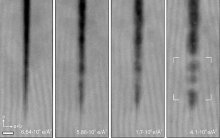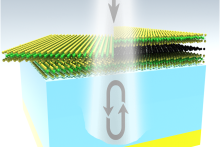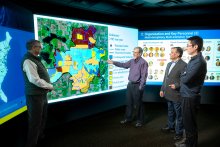News

Researchers develop state-of-the-art device to make artificial intelligence more energy efficient
Posted
Engineering researchers at the University of Minnesota Twin Cities have demonstrated a state-of-the-art hardware device that could reduce energy consumption for artificial intelligent (AI) computing applications by a factor of at least 1,000.

Surprising discovery shows electron beam radiation can repair nanostructures
Posted
In a surprising new study, researchers at the University of Minnesota Twin Cities have found that the electron beam radiation that they previously thought degraded crystals can actually repair cracks in these nanostructures.

Research brief: UMN-led team achieves near-perfect light absorption in atomic-scale material
Posted
A University of Minnesota Twin Cities-led team has, for the first time, engineered an atomically thin material that can absorb nearly 100 percent of light at room temperature, a discovery that could improve a wide range of applications from optical communications to stealth technology.

New material could hold key to reducing energy consumption in computers and electronics
Posted
A University of Minnesota Twin Cities team has, for the first time, synthesized a thin film of a unique topological semimetal material that has the potential to generate more computing power and memory storage while using significantly less energy.

U of M Minnesota Semiconductor Manufacturing Consortium launches, paving way for high-paying job opportunities
Posted
The University of Minnesota's Technological Leadership Institute (TLI) announced the launch of the Minnesota Semiconductor Manufacturing Consortium, a groundbreaking initiative that, with the help of industry partners, aims to upskill Minnesota's technical workforce for careers in semiconductor manufacturing.

University of Minnesota to lead new $20M AI Institute focusing on climate-smart agriculture and forestry
Posted
The University of Minnesota Twin Cities received a $20 million grant from the National Science Foundation and the USDA National Institute of Food and Agriculture to lead a new research institute that will leverage artificial intelligence to help absorb and store carbon in farms and forests.

University of Minnesota to lead $2 million federal grant to study human-centered AI for news recommender systems
Posted
The University of Minnesota Twin Cities is one of five institutions leading National Science Foundation-funded projects to support artificial intelligence research infrastructure that will help scientists better understand and study AI for applications like news recommendation systems.

How is TikTok affecting our mental health? It’s complicated, new U of M study shows
Posted
University of Minnesota Twin Cities computer science researchers found that the nature of TikTok’s algorithm can have both positive and negative outcomes for users’ mental health and sense of belonging on the platform.

Researchers create breakthrough spintronics manufacturing process that could revolutionize the electronics industry
Posted
University of Minnesota Twin Cities researchers, along with staff at the National Institute of Standards and Technology (NIST), have developed a breakthrough process for making spintronic devices that has the potential to create semiconductor chips with unmatched energy efficiency and storage for use in computers, smartphones, and many other electronics.

University of Minnesota to offer new Data Science for Chemical Engineering and Materials Science master’s degree
Posted
In fall 2023, the University of Minnesota Twin Cities College of Science and Engineering will begin offering a new master’s degree in data science for chemical engineering and materials science to meet the growing industry demand for scientists and engineers with computational and data analytics skills.
